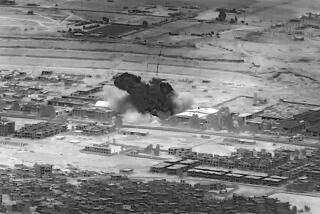U.S. Shouldn’t Mince Words With the Saudis
- Share via
After the shock and the outrage and the mourning come the recriminations.
Arlen Specter (R-Pa.), whose Senate Intelligence Committee will soon hold hearings on the bombing in Dhahran last week that killed 19 American servicemen, suggests that the Pentagon didn’t move aggressively enough to get Saudi Arabia to take security measures that might have prevented the attack. He faults Defense Secretary William J. Perry, the man in charge, and suggests he should be replaced. But the evidence that Perry and other higher-ups knew about the security problem is inconclusive. To hold the secretary responsible may be premature at best.
What’s much clearer is that the Saudis have been much less cooperative with Washington than required by the deteriorating security conditions in their country and the threat to Americans there. In two key areas the Saudis refused to provide help that might have been of value in deterring last week’s atrocity or at least in mitigating its deadly consequences.
First, they refused to allow U.S. intelligence agencies to talk to the four men convicted of last November’s bombing in Riyadh that killed five Americans and two Indians. The four were beheaded May 31. U.S. officials don’t doubt their guilt. They do think the four might have provided information about internal opponents of the Saudi government that could have been useful in guarding against attacks like the one in Dhahran. The xenophobic Saudi regime traditionally resists sharing information, especially about domestic discontent. For it to do otherwise would be to call attention to its own many shortcomings, ranging from flagrant corruption to systematic abuses of human rights.
Second, the Saudis twice refused U.S. requests to extend the defense perimeter around the Dhahran housing site. That allowed the truck bombers to get within 80 feet of the facility. Only now are barriers going up to keep potential attackers 400 feet from the buildings, a distance that should significantly lessen the effects of any explosion.
Hindsight is always 20-20, and it’s obvious now that more could have been done to protect the Americans at Dhahran. The question is should Washington have insisted on an extended defensive zone and on greater intelligence sharing about internal challenges to the regime?
U.S. administrations have always walked on tiptoe in dealing with the Saudi royal family, fearful of giving its influential anti-Western elements further reason for suspicion and non-cooperation. But the explosions at Riyadh and Dhahran--attacks that unmistakably targeted Americans--make clear that the time has come for taking firmer steps. Its vast oil reserves and consequent critical importance to the global economy make Saudi Arabia a vital U.S. interest. Protecting the lives of Americans is no less a vital interest. Washington must meet both obligations. If that requires speaking more insistently to the Saudis about better security for U.S. personnel, then let the blunt words be spoken. Better that than more needless casualties.
More to Read
Sign up for Essential California
The most important California stories and recommendations in your inbox every morning.
You may occasionally receive promotional content from the Los Angeles Times.













